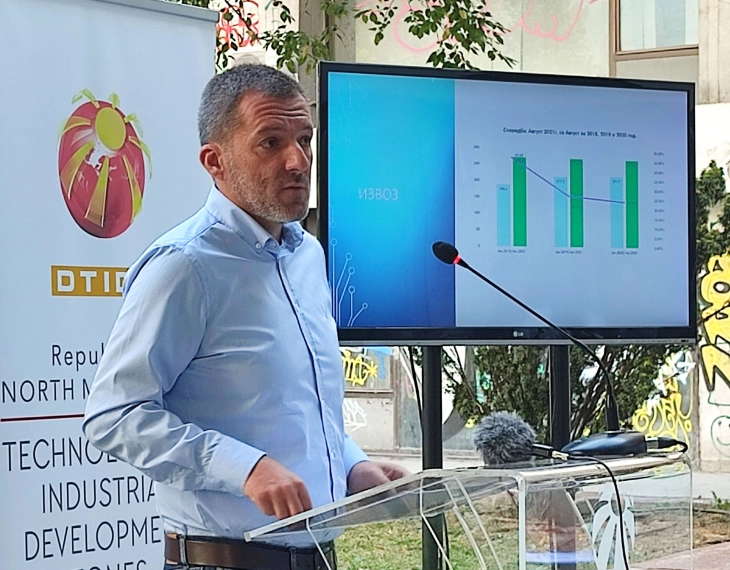Economic activity at TIDZ continues to increase, new foreign investments stand at EUR 160 million

Skopje, 14 September 2021 (MIA) – Economic activity at technological-industrial development zones (TIDZ) has continued to increase and the upward trend is expected to resume until the end of the year. The total amount of new foreign investments is close to EUR 160 million. 2,500 new jobs are expected to open, while export generated by new investments should in the next decade amount to EUR 3 billion, TIDZ head Jovan Despotovski told a news conference on Tuesday.
Economic activity in export in the period January-August 2021 compared to January-August 2020, has increased by nearly 51%, reaching a total of EUR 2.04 billion. Compared to the pre-pandemic period in 2019, it has grown by 11%, while compared to 2018 by 32%.
“These figures clearly show that economic activity within TIDZ has not only overcome the effects of the pandemic, but is steadily growing,” Despotovski said at the presentation of findings of a comparative analysis of economic activity in free industrial zones.
He stressed expectations that the stable upward trend at TIDZ will resume and reach EUR 3 billion.
“August 2021 has registered a 24% growth compared to the same month last year, as well as 26% increase compared to 2019 and 45% increase compared to 2018. Total export at TIDZ in August reached EUR 275 million, which demonstrates economic stability. In regard to import, activity has increased in the period January-August 2021 compared to the same time last year by 64% and stands at EUR 2.036 billion. It has also increased by 18% compared to 2019 and 55% compared to 2018,” Despotovski noted.
In August 2021, he added, import at TIDZ stands at EUR 269 million, 10% more compared to the same month in 2020, 26% more compared to 2019 and 38% more compared to 2018.
“So far, import has a stable upward trajectory and despite challenges companies face, I expect this trend to resume until the end of the year,” Despotovski told the press conference.
The number of workers at TIDZ in August 2021, compared to August 2020, has increased by 7.35%.
“The upward trend is also evident in the number of workers. Companies are obliged to create 7,000 new job positions and we expect this trend to further intensify in the upcoming period, so that by the end of 2022, there are 20,000 people working at TIDZ, not including those employed by companies we’re yet to sign contracts with,” Despotovski stressed.
He announced three new foreign investments at TIDZ, worth EUR 54 million, set to create 680 new jobs, with projected earnings of EUR 850 million in the next decade and investment return of EUR 55 million.
“Investments are located in Shitp, Skopje and Kichevo. Talks have been finalized and contracts sent to relevant institutions. New foreign investments in 2021 stand at EUR 160 million and entail 2,500 new jobs,” Despotovski underlined.
TIDZ, he added, has initiated a revision of guidelines for foreign investments expenditures crucial for verification of investors costs and used for payment of state assistance. A final revised document has been defined and a mechanism for verification of expenditures has been set up.
“We’ve also established internships for students and in line with changes to the law on financial support ensured greater participation of domestic companies at TIDZ. We’re working with the IFC on a special program, which targets domestic businesses and investors, with the aim of raising their level of their technological readiness, improving cooperation with foreign investors and preparing them for export. The second aspect entails encouraging productivity growth, set to result in salary increase. We’ve also prepared a presentation on investment opportunities in North Macedonia, changing the approach from offering cheap workforce to offering an opportunity for joint profit,” Despotovski told the presentation.
No company has lest TIDZ since the start of the year, but several leases have been terminated.
“Seven out of our 15 zones remain unused. One of the issues is the lack of qualified workers, so we’re thinking about introducing a mobile workforce approach,” the TIDZ head said.







